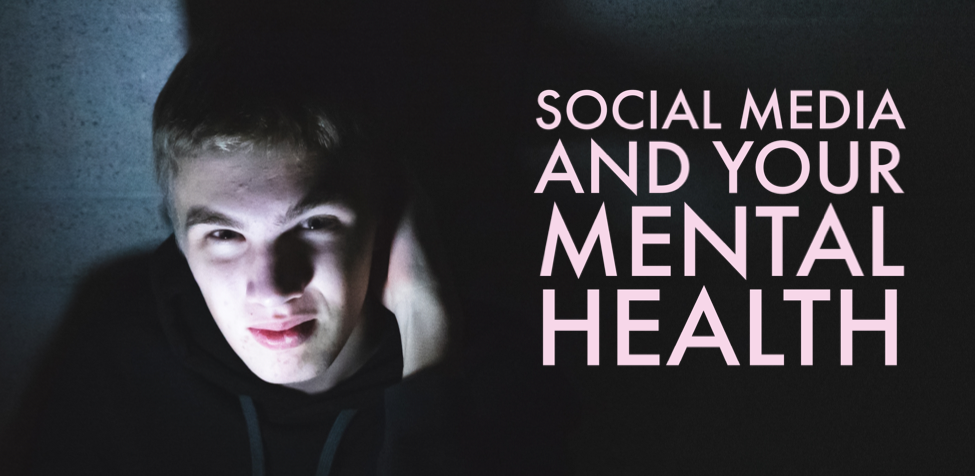Is Social Media Affecting Your Mental Health?

Social media became a crucial communication tool during the pandemic, enabling people to reconnect with family and friends who are far away or whom they have lost touch with.
Social media Facilitates Relationships
In the absence of face-to-face interactions due to stay-at-home orders, people used social media to exchange information and connect. They could connect and receive social support through it that they would not have otherwise.
Social Media Enhances Positive Emotions
Social media usage is encouraged. Checking for comments and likes on their status updates and browsing other people’s posts can quickly become addictive.
Dopamine, also known as the feel-good chemical, is occasionally released by social media, activating the brain’s reward centre. People continue to visit because they want to repeat these pleasurable experiences due to the dopamine release.
Social Media Boosts Self-esteem
Social media can also increase one’s sense of self-worth, mainly if one is seen favourably by others or receives a lot of likes or comments on their content. Additionally, social media enables some people to express aspects of their identity that might be difficult to express in person.
People with social anxiety who find it difficult to interact with others in person may find social media especially beneficial.
Concerns about Social Media and Mental Health
Despite the above advantages, researchers are finding that social media has some drawbacks, particularly regarding mental health.
Use of Social Media May Increase Depression
When disputes break out online, technology meant to unite people can have the opposite effect. Social media has been associated with loneliness, anxiety, and depressive disorders. People might feel alone and isolated as a result.
According to a 2017 study, teens who use social media more than two hours per day are much more likely than occasional users to rate their mental health as fair or poor.
Occasional social media users are three times less likely than heavy users to experience symptoms of depression, according to a large-scale study of young adults in the U.S.
Social Media Can Diminish Your Self-esteem
Although social media occasionally boosts self-esteem, it can also make you feel inadequate about your life and appearance. Even if you know that the images you see online have been altered or are a highlight reel of someone else, these emotions can still make you feel insecure, envious, and unsatisfied.
Concern About Missing Out
The “fear of missing out,” also known as FOMO, is another social media-related mental health phenomenon. Facebook and Instagram are two social media platforms that amplify the anxiety that you’re missing something or that others are having a better life than you.
When FOMO is severe, it can make you dependent on your phone, where you constantly check for updates or answer every alert.
Social Media Can Promote Self-indulgence
Sharing countless selfies and your private thoughts on social media can lead to an unhealthy self-centeredness that makes you prioritise maintaining your online persona over creating real-life memories with your loved ones.
Strenuous attempts to manage perceptions or obtain outside validation may have psychological repercussions, mainly if the approval you seek is not adequately granted. Ultimately, the absence of encouraging comments online can result in self-doubt and self-hatred.
Issues With Impulse Control
Excessive social media use can cause problems with impulse control, mainly if you use a smartphone to access your social networks. This entails that you have constant access to your accounts, making it simple for you to stay connected and potentially impairing your ability to concentrate and pay attention. Even worse, it might interfere with sleep and jeopardise interpersonal relationships.
The Use of Social Media As An Unhealthy Coping Mechanism
Social media can become an unhealthy coping mechanism for complicated feelings or emotions. For instance, if you use social media to pass the time when you’re bored, lonely, or depressed, you may be trying to block out negative emotions.
In the end, social media is a lousy way to self-soothe, especially since it frequently makes you feel worse rather than better.
Signs That Social Media Is Affecting Your Mental Health
According to a 2018 University of Pennsylvania study, self-monitoring may alter how one views social media. According to the study, using social media less frequently can significantly reduce feelings of loneliness and depression. People can significantly increase their overall well-being by using self-monitoring and making adjustments.
It might be time for you to reevaluate your use of social media. Here are a few more indicators that social media use may be detrimental to your life and mental health:
- You’re experiencing more anxiety, depression, and loneliness symptoms
- You spend more time online with friends and family than in real life
- You frequently feel envious of others or tend to compare yourself negatively to others on social media
- Online trolls or cyberbullies are harassing you
- You are taking outrageous photos or acting riskily to get likes
- Your social media use is affecting your ability to complete your work, family responsibilities, or academic obligations
- You don’t have much time for self-care practises like meditation, introspection, exercise, or sleep
It may be time to reevaluate your online habits if you spend a lot of time on social media and start to experience feelings of sadness, dissatisfaction, frustration, and loneliness that affect your life and relationships.
You might need to detox from social media and go offline for a while to protect your mental health. A therapist can help you with the process while identifying any underlying emotional or psychological issues you may have.
It’s essential to speak with a therapist to be evaluated if you discover that despite changing how you use social media, you are still exhibiting symptoms of depression or anxiety. You will feel better soon with the proper care.
Click www.hopetrustindia.com for an online or in-person appointment with an expert.